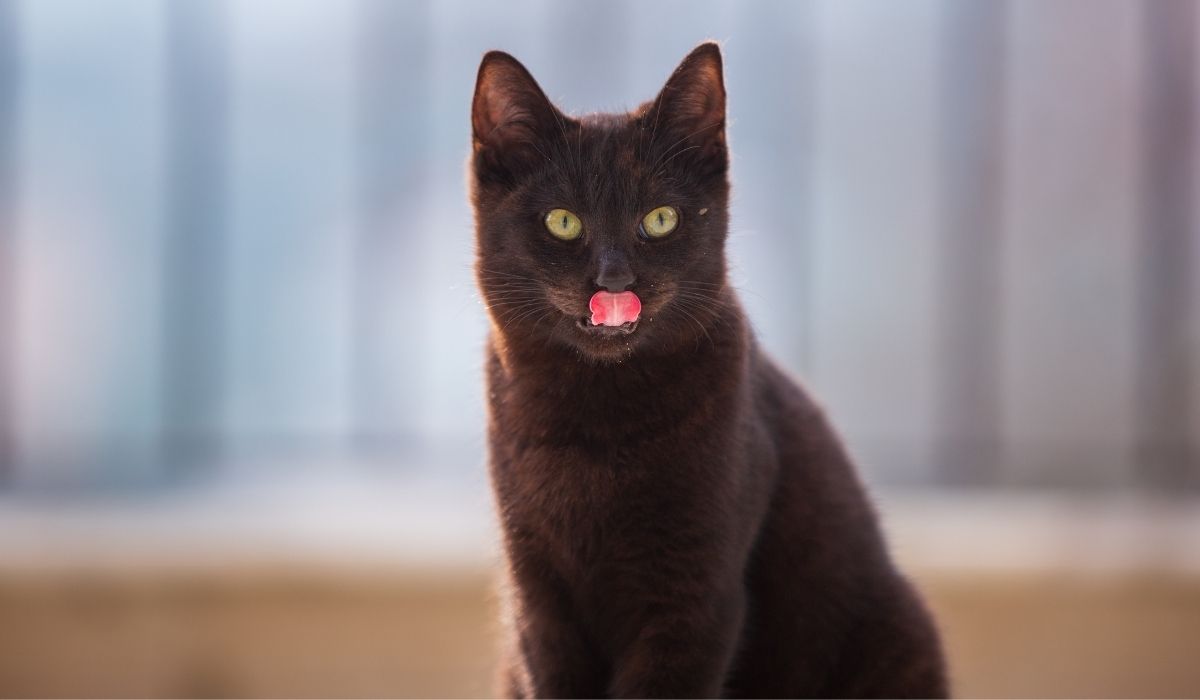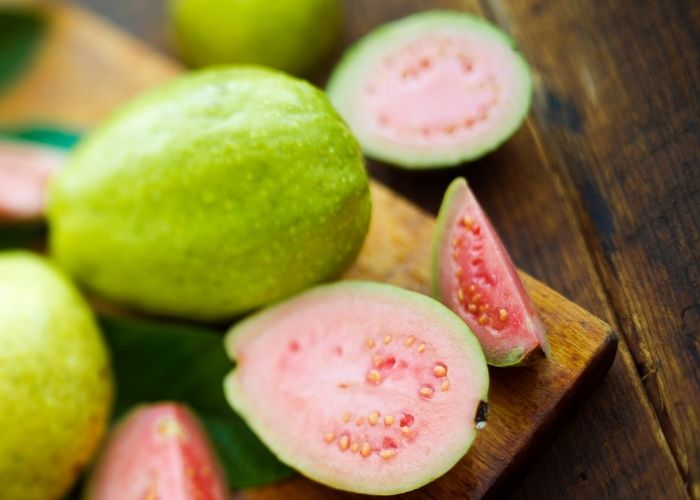Guava is a sweet tropical fruit packed with Vitamin C, but can cats eat guava? I unpack this fruit in this article to give you the best answer!
Many people agree that guava has a pleasing smell and flavor, and in my house, the cats do too! Whenever I bring some from the farmers’ market, they get a tingle in their nose and beg for a bite, so I started wondering if guava is safe for cats to eat.
IMPORTANT: At stuffaboutcats.com, we regularly consult with licensed veterinarians and other industry experts. However, the information found on stuffaboutcats.com should not be viewed as veterinary advice. We do our best to help you better understand your cats, but the information on this blog is not a substitute for veterinary guidance.
I did an extensive search and am happy to say that the answer is universal. In this article, I share the safety of guava, the benefits, and how to best serve this tropical fruit to your cats.
Can Cats Eat Guava?
The short answer is yes! There’s no evidence that guava is toxic to cats.
Like you, your cats can safely enjoy the exotic taste of this strawberry-pear hybrid and benefit from it too! You just need to serve it to them in moderation to avoid the potential issues it may cause.
The Benefits Of Guava For Cats
The good news is that guava is full of minerals and vitamins! It contains Vitamin A, more Vitamin C than oranges, is an excellent source of iron, and has calcium and potassium traces. Here’s how each can benefit your kitty:
Vitamin A
Cats are crepuscular, so they do most of their hunting when it’s dark, and Vitamin A is essential for their night vision. It also contributes to healthier skin, a boosted immune system, and can help your cat’s body fight against the formation of cancer cells.
Vitamin C
It sounds crazy, but it’s true – guava does contain more Vitamin C than the ever-so-popular orange!
Feeding your cat guava will boost their Vitamin C intake and help them produce more collagen, which is essential to keep their bones and joints healthy. Vitamin C also improves their immune system and can, strangely enough, help relieve stress.
Overall, it’s a good Vitamin for your cats to consume, but watch out for giving too much as this can cause some abdominal bloating and diarrhea.
Iron
Insufficient amounts of iron could lead to anemia, making it crucial to include iron-rich food in your cat’s diet. Besides meat, fruits can also boost their iron levels, and guava is one of those that do.
Guava contains 0.25 mg of iron per 100 g serving, and paired with its Vitamin C content; it’s a powerhouse of goodness!
Calcium
It’s no secret that calcium is vital for the formation of healthy bones and teeth, but did you know that it’s also an electrolyte?
The fluid concentration in your cat’s cells is regulated by the electrolytes in calcium, which helps them send and receive signals from the brain, and aids in muscle contraction like the pumping of a heart.
Potassium
Like calcium, potassium is a crucial electrolyte too. These minerals all contribute to the normal function of your feline’s nerves and muscles.
The Risks Of Guava For Cats
Guava doesn’t come with no risks, which brings us to the bad news about this yummy fruit. Luckily, it only has the potential to cause these adverse effects if you overfeed it to your cat, so make sure to keep your cat’s guava portions small.
Seeds: Guava contains a lot of seeds that could be a choking hazard.
Oxalate: Also in its seeds is high amounts of oxalate, which could lead to oxalate stones or an irritated digestive tract.
Diarrhea: Guava also contains fiber, which can help cats who suffer from constipation but cause diarrhea when too much is consumed.
Sugar: The sweetness of this tropical fruit comes from its high sugar content, which isn’t good for your kitty, or you!
Learn more about What Fruit Is Good For Cats?
How To Feed Guava To Your Cat
There aren’t many complications when feeding guava to your cat, but remember these points before serving it:
- Thoroughly wash the guava before chopping it into slices.
- Remove as many seeds as possible.
- Only feed one or two slices per serving and one or two servings per week.
- The skin isn’t toxic, so you only need to remove it if your cat doesn’t like it.
- Never feed your cat canned guava or store-bought guava juice because it contains high amounts of sugar, chemicals, and other preservatives that may harm your kitty.
You can serve the guava in slices, bite-sized bits, mashed on its own, mixed with other cat food, or blend it to create homemade juice or an icy slushed desert if you pre-freeze the fruit. There are many ways to use guava as a fun treat for your cat, but a plain and straightforward serving will delight their taste buds too!
The Last Day
If your cat – like mine – has ever shown interest in guava, you should know that it’s perfectly safe to give them a piece. This exotic fruit is high in the right nutrients, tastes luxurious, and is versatile enough to serve in different ways.
Sliced guava can stay fresh in the fridge for 3 – 4 days, so you can serve it to your kitty with a meal and later as a treat – if you don’t eat the rest yourself!
I hope this article answered your questions about feeding guava to your cat and inspired you to give it a try. If you have any more questions, pop them in the comments!
What fruits are poisonous to cats?
Avocados and cherries are the two most common fruits that could cause your cat's death. Steer clear from these and serve apples, bananas, strawberries, or blueberries instead.
Can cats eat guava leaves?
Yes.
Guava leaves are edible, and no evidence indicates that it is toxic to cats.
Can cats have guava juice?
Yes.
Guava juice isn't toxic to cats, but some brands may contain lots of sugar, so only serve it in moderation or opt for a homemade version instead.
How many guavas should I feed my cat?
It's recommended that you limit fruit to 2% of our cat's diet. A handful per month should be enough if you're feeding other fruit with the guava.
Read more about Is Nutritional Yeast Good For Cats?

